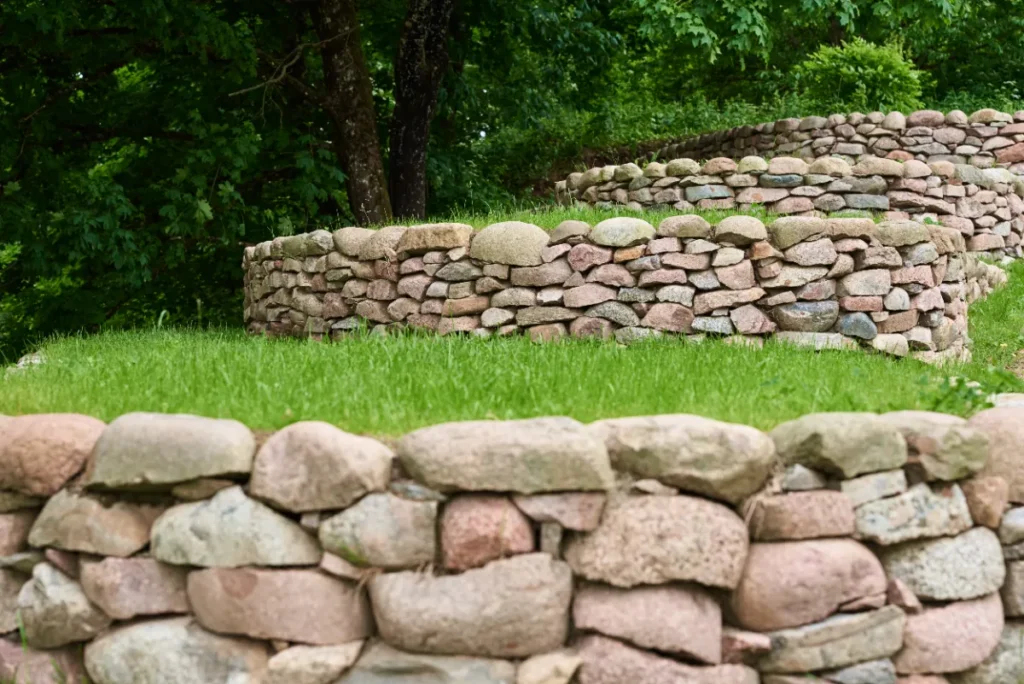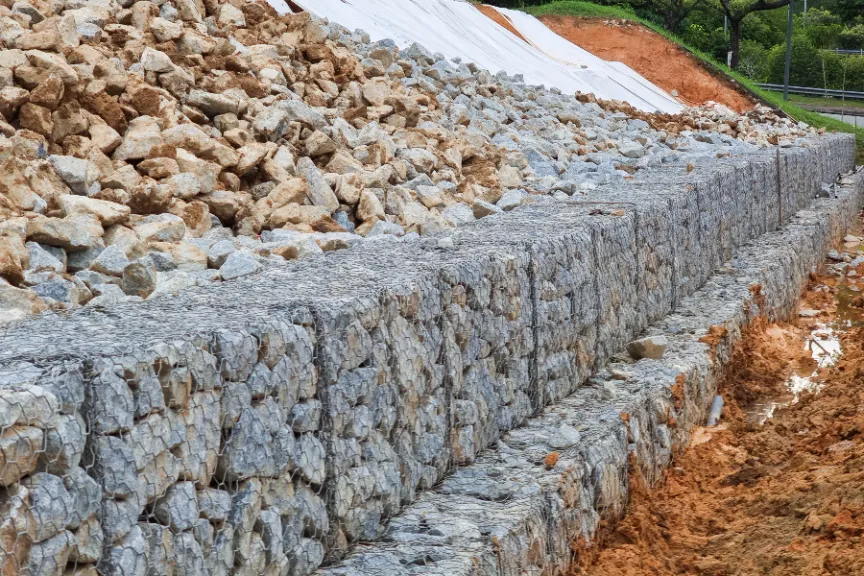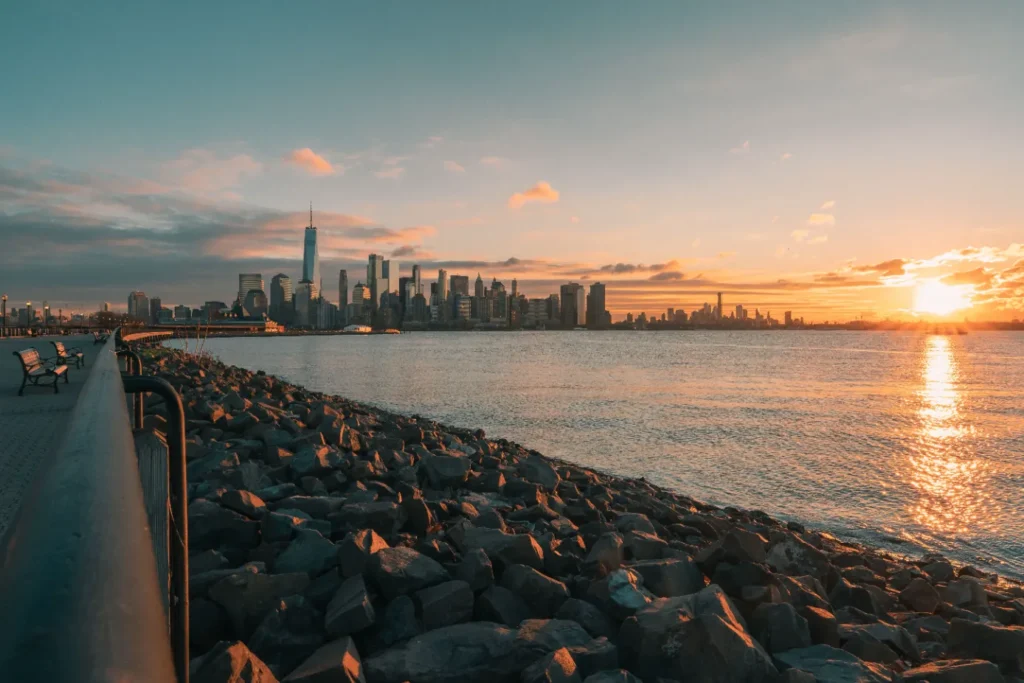Your Go-To Guide on Types of Retaining Walls | Piers and Piles
Choosing the right retaining wall type is essential for ensuring lasting stability, effective erosion control, and reliable soil retention. From residential landscaping to large-scale commercial projects, retaining walls serve a variety of purposes that depend on specific soil conditions, environmental factors, and project requirements. In this guide, we’ll discuss the primary types of retaining walls and their unique benefits, helping you make an informed choice for your property.
Secure the Best Retaining Wall Solution for Your Long Island Project—Contact Us Today!
What is a Retaining Wall?
A retaining wall is a sturdy structure designed to hold back soil, manage elevation changes, and prevent erosion. These walls are commonly used in landscaping, construction, and infrastructure projects to create level surfaces, stabilize slopes, and enhance aesthetics. Built from materials like concrete blocks, poured concrete, or stone, retaining walls are engineered to withstand lateral earth pressure and environmental forces.
Retaining walls serve both functional and decorative purposes, making them a vital solution for residential, commercial, and industrial applications. Whether it’s terracing a garden, supporting a parking lot, or reinforcing a highway, retaining walls are designed to provide durability and long-term stability.
For the best results, working with a professional contractor ensures your retaining wall is designed and installed to meet the unique needs of your property and local conditions.
Benefits of Choosing the Right Type of Retaining Wall
Selecting the correct retaining wall type offers numerous advantages, especially in challenging environments. The right choice can greatly enhance stability, ensure cost-effectiveness, and contribute to the overall functionality of your space.
Properly matched retaining walls provide dependable soil retention and slope stability.
Certain wall types are designed to handle specific soil types, slopes, and climate challenges.
When the wall type suits project demands, it minimizes repair needs and long-term maintenance expenses.
Minimal disruption to the surrounding landscape during installation, preserving the natural environment and ecosystem.
Different Types of Retaining Walls
There are numerous types of retaining walls, each designed to address specific project needs, soil types, and environmental conditions. Selecting the right type of retaining wall ensures optimal performance, stability, and longevity. In the following sections, you’ll find descriptions for each type of retaining wall, covering its benefits and applications to help you make the most informed choice for your project.
Residential Retaining Walls
Residential retaining walls are ideal for residential landscaping, small garden projects, and private property enhancements. Designed for functionality and aesthetic appeal, each type of retaining wall in this category offers homeowners reliable solutions for soil retention, erosion control, and slope management.
Click on the toggles below to learn more about each type of retaining wall:

Gravity Retaining Walls
Gravity Retaining Walls rely on their weight to resist soil pressure. Gravity Retaining Walls are ideal for residential landscaping with moderate slopes.
Segmental Retaining Walls (SRWs)
Segmental Retaining Walls are made of interlocking concrete blocks. Segmental Retaining Walls are modular and flexible, perfect for curved gardens or raised beds.
Precast Modular Block Walls
Precast Modular Block Walls use large factory-made blocks for stability. Precast Modular Block Walls are durable and low-maintenance, ideal for residential sloped landscapes.
Timber Retaining Walls
Timber Retaining Walls are constructed from treated wood for a natural look. Timber Retaining Walls are affordable and easy to install for small residential projects.
Timber Crib Walls
Timber Crib Walls are frameworks filled with soil or gravel. Timber Crib Walls offer a rustic aesthetic while providing soil retention for residential slopes.
L-Shaped Retaining Walls
L-Shaped Retaining Walls use their unique shape for extra stability. L-Shaped Retaining Walls are ideal for residential properties with slopes prone to erosion.
Boulder Retaining Walls
Boulder Retaining Walls use large rocks to create a rugged structure. Boulder Retaining Walls are perfect for properties with irregular terrain and natural aesthetics.
Rock Retaining Walls
Rock Retaining Walls consist of carefully stacked stones for stability. Rock Retaining Walls combine soil retention with visual appeal for residential landscapes.
Dry Stone Retaining Walls
Dry Stone Retaining Walls are mortarless walls constructed from stacked stones. Dry Stone Retaining Walls provide a rustic look and are ideal for small residential projects.
Modular Block Retaining Walls
Modular Block Retaining Walls use interlocking concrete blocks. Modular Block Retaining Walls are easy to assemble and provide reliable soil retention.
Concrete Block Retaining Walls
Concrete Block Retaining Walls are stacked, reinforced blocks for long-term stability. Concrete Block Retaining Walls are used in terraces and patios for durability.
Limestone Retaining Wall
Known for its durability and timeless beauty, limestone retaining walls provide erosion control, terracing, and aesthetic appeal.

Commercial Applications of Retaining Walls
Commercial retaining walls must withstand significant pressure and support heavy loads. Whether you’re stabilizing soil for a highway construction project or enhancing a waterfront property, these walls need to be durable and capable of resisting environmental forces.
Below are some of the most effective types of retaining walls used in commercial applications. Click on the toggles to learn more about each type:
Mass Concrete Retaining Walls
Mass Concrete Retaining Walls are built from solid poured concrete to handle high lateral pressures. These walls are ideal for large-scale commercial projects requiring significant load-bearing capacity and stability.
Precast Concrete Panel Walls
Precast Concrete Panel Walls consist of factory-made concrete panels assembled on-site. These walls are durable and quick to install, making them suitable for time-sensitive commercial projects.
Concrete Panel Retaining Walls
Concrete Panel Retaining Walls are created by stacking reinforced concrete panels. These walls provide robust soil retention and are perfect for deep excavations in commercial applications.
Secant Pile Walls
Secant Pile Walls are constructed by overlapping concrete piles to form a continuous barrier. Secant Pile Walls are ideal for projects requiring water resistance and soil stabilization in high-pressure environments.
Contiguous Pile Walls
Contiguous Pile Walls use closely spaced piles to form a continuous structure. Contiguous Pile Walls are effective for stabilizing soft soils in urban or commercial developments.
Tangent Pile Walls
Tangent Pile Walls are made by placing piles side-by-side without overlap. Tangent Pile Walls are excellent for soil stabilization in deep foundations or challenging site conditions.
Tie-Back Retaining Walls
Tie-Back Retaining Walls use tensioned anchors drilled into the soil for additional support. Tie-Back Retaining Walls are ideal for deep excavations in commercial or confined urban areas.
Soil Nail Walls
Soil Nail Walls reinforce slopes or excavations by inserting steel bars into the soil. Soil Nail Walls are used in urban construction where space is limited and stability is essential.
Anchor Retaining Walls
Anchor Retaining Walls use steel anchors to stabilize the structure. Anchor Retaining Walls are commonly applied in commercial projects with shifting soils or high lateral pressures.
Flexible Pavement Retaining Walls
Flexible Pavement Retaining Walls adapt to dynamic loads from traffic and environmental factors. These walls are often used in highways and other road infrastructure projects.
Post-and-Panel Retaining Walls
Post-and-Panel Retaining Walls combine vertical posts and horizontal panels for a durable structure. Post-and-Panel Retaining Walls are versatile, making them ideal for commercial and industrial sites.
Coastal and Waterfront Applications
Coastal retaining walls must withstand water pressure, erosion, and shifting soil. From stabilizing marinas to protecting properties from storm surges, these walls are designed to handle high-risk conditions. Below are eight effective types of retaining walls for coastal and marine environments.
Click on any of the toggles below for more information about each type of retaining wall:

Marine/Coastal Retaining Walls
Marine/Coastal Retaining Walls are made of concrete or stone to resist tidal forces. Marine/Coastal Retaining Walls protect waterfront properties from erosion and wave impact.
Flood Barrier Walls
Flood Barrier Walls are constructed from reinforced concrete or steel to block rising waters. Flood Barrier Walls safeguard properties in flood-prone coastal areas.
Storm Surge Walls
Storm Surge Walls use reinforced materials to withstand powerful waves. Storm Surge Walls protect coastal properties from severe storm damage and flooding.
Bermed Retaining Walls
Bermed Retaining Walls use compacted earth to resist water flow. Bermed Retaining Walls are natural and cost-effective for flood and erosion control.
Soldier Pile Retaining Walls
Soldier Pile Retaining Walls combine vertical beams and horizontal supports. Soldier Pile Retaining Walls stabilize soil in coastal excavations.
Steel Retaining Walls
Steel Retaining Walls are constructed b driving heavy-duty sheets od steel into the ground. Steel Sheet Piles resist water pressure and erosion in large-scale coastal projects.
Cofferdam Wall
Cofferdam walls create temporary enclosures to keep water out during construction, providing a dry and stable workspace in marine environments.
Vinyl Sheet Piles
Vinyl Sheet Piles are lightweight and eco-friendly alternatives. Vinyl Sheet Piles offer long-term erosion control for waterfront properties.
Gabion Walls
Gabion Walls consist of wire baskets filled with stones. Gabion Walls provide durable soil retention and blend naturally into coastal landscapes.
Living Walls (Green Walls)
Living Walls combine soil retention with plant growth for eco-friendly solutions. Living Walls enhance aesthetics while providing erosion control for coastal areas.
Geocell Retaining Walls
Geocell Retaining Walls use polymer grids filled with soil for flexibility. Geocell Retaining Walls stabilize slopes and control erosion in high-risk coastal sites.
Cement-Bound Sandbag Walls
Cement-Bound Sandbag Walls use sand-filled bags reinforced with cement. Cement-Bound Sandbag Walls are temporary barriers for emergency flood control.
Riprap Retaining Wall
Riprap retaining walls use stone or rubble to prevent erosion and protect slopes in coastal or high-flow water areas.
Our Areas of Expertise
At Piers and Piles, we offer a wide range of specialized services designed to meet the unique challenges of Long Island, Brooklyn, and Queens. Backed by years of experience, we deliver retaining wall solutions that combine strength, durability, and style. Our custom designs meet diverse project needs, ensuring long-lasting performance and visual appeal for every application.
Key Retaining Wall Types We Offer:
Retaining Wall Installation
Expert retaining wall installation services ensure stable, long-lasting solutions tailored to your property’s specific needs.
Retaining Wall Repair
Our team repairs damaged retaining walls, restoring their strength, stability, and appearance with minimal disruption to your property.
Retaining Walls for Flood Prevention
Protect your property from water intrusion with retaining walls designed to manage water flow and reduce flood risks.
Retaining Walls for Erosion Control
Safeguard your landscape with retaining walls that prevent soil movement and stabilize slopes in residential and commercial areas.
Steel Sheet Pile Installation
Our steel sheet pile installation offers reliable solutions for shoring, flood prevention, and marine applications.
Custom Retaining Walls
Tailored to fit your unique project requirements, our custom retaining walls combine strength, durability, and aesthetic appeal.
Why Choose Piers and Piles for Your Retaining Wall Project?
At Piers and Piles, we provide expert solutions for all your retaining wall needs, offering high-quality materials and proven installation techniques.
Reasons to choose us:
- Experienced Retaining Wall Contractors
- Proven Success in Diverse Project Types
- High-Quality Materials
- Certified Installers
- Friendly Customer Service
- Industry-Leading Warranties
Get Expert Advice on the Best Types of Retaining Walls for Your Long Island Property Today!
Choosing the right type of retaining wall is essential for ensuring the stability, durability, and functionality of your property. Each type of retaining wall—whether it’s for erosion control, load-bearing support, or aesthetic enhancement—serves a unique purpose based on your site’s specific conditions. Investing in the correct retaining wall not only protects your land but enhances the overall value and appearance of your property.
Ready to Protect Your Property with the Right Retaining Wall? Contact Piers and Piles Today to Discuss Your Project Options!